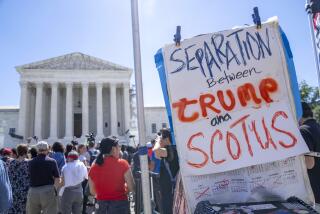PERSPECTIVE ON CONSTITUTIONAL RIGHTS : Hard to Say No, Trapped on a Bus : The Supreme Court wants us to sacrifice more privacy to the war on drugs; is this our vision of America?
Like many government officials, judges do not always mean what they say. Or say what they really mean. Sometimes the gap between words and truth can be laid to poor expression, or the compromise of conflicting values. But more often it masks a dangerous truth.
In its recent decision on searches aboard buses, the Supreme Court insists that it has not changed constitutional law. By use of the legal fiction of consent, however, the court may have diminished the real freedom of traveling Americans.
Terrance Bostick was on a bus going from Miami to Atlanta when it stopped to pick up passengers in Fort Lauderdale, Fla. There, as part of an established local practice, two sheriff’s deputies boarded the bus to look over the passengers for drug suspects. The two displayed police badges, wore police raid jackets and one carried a gun.
The police had no strong reason to suspect Bostick, but nevertheless approached him as he sat at the back of the bus. Following their usual procedure--one followed by police in a number of cities--they asked to see Bostick’s ticket and identification. During this process one of the officers stood in the bus aisle, partially blocking Bostick’s exit.
The questioning and paper check turned up nothing unusual but the officers then asked to search Bostick’s luggage. According to the trial court in the case (Bostick disputes this), Bostick agreed to the search and police found cocaine in one of his suitcases.
The Florida Supreme Court declared the search illegal, saying that the approach of the officers, in the confined space of the bus, amounted to a seizure of Bostick without any cause. Since the seizure was illegal, so was the search that followed it.
By a 6-3 vote the U.S. Supreme Court reversed the Florida court, saying that it had overemphasized the importance of setting. The high court sent the case back for a determination of whether a reasonable person in Bostick’s situation would feel compelled to answer police questions.
On its face the decision leaves open the critical question of constitutionality, but the strong message of the case is to permit bus sweeps. The Supreme Court’s holding suggests that on buses, trains and other means of general transport, police officers may enter a passenger compartment and approach anyone with questions and requests to search. Evidence collected in this manner will be admissible in court as long as the subject “voluntarily” speaks and “voluntarily” consents to a search.
The problem is that the court’s idea of what counts as voluntary bears only a distant relation to the experience of most citizens.
For many years the court (and this includes decisions by earlier, more liberal justices) has given the police considerable power to approach and question persons in public. Despite the fact that most people feel they have no choice but to cooperate with armed officers who are backed by the powers of arrest and public humiliation, the court has taken such cooperation at face value. Only if there is stark evidence of intimidation, such as drawn guns or a particularly fearful subject, has the court applied the constitutional restrictions of the Fourth Amendment.
Obviously many citizens cooperate with police against their real wishes. The astonishing number of defendants who give incriminating answers to police questions and permit searches that reveal drugs and contraband only underscores the fact that most people lack the confidence, and knowledge of rights, to refuse a police request.
To some extent this approach can be justified as a necessary compromise of conflicting values. The police need some informal powers of investigation. Good police work includes intuitive hunches and generalized inquiry. We want, and need, the police to ask lots of questions, for we want and need them to supply many important answers.
But when police actions seriously invade privacy, constitutional restrictions must apply. When police make a general practice of questioning large numbers of people, the vast majority of whom are law-abiding, the privacy invasion becomes significant. The intrusion on private life becomes even more serious when the citizen has little chance to leave. At this point the fiction of voluntary cooperation becomes truly dangerous.
How many travelers passing through a strange city on a bus or a train, anxiously awaiting its departure, will have the confidence in themselves, or trust in the law, to tell a police officer that they would prefer not to answer any questions? The court acts as if all travelers are brash lawyers, that we’re all budding Alan Dershowitzes, ready to assert constitutional rights at a moment’s notice.
Most troubling about this view is the way in which it reinforces some of the deepest-rooted inequities in our society. The court’s standard might make sense for the executive who travels first class and is used to having his or her way in all things. For this person a lawyer is a phone call away and a civil action against the police a viable option. Maybe this traveler will speak her mind.
But the court’s view makes no sense for Americans who have little experience with the exercise of power. For persons who lack easy access to lawyers, who rightly fear the power of police over their lives, the existence of a theoretical right to refuse is a dangerous fiction.
And of course police will generally focus their attentions not on the socially confident, not upper- or middle-class whites, but on those who look most like drug traffickers. Minorities, the young and the less-affluent come in for extra scrutiny.
Police may be right that a disproportionate number of drug traffickers are young, male and minority. They may be right that many take buses and trains to transport drugs. But remember that the great majority of those approached in police sweeps are innocent. They attract attention because of their appearance.
Encounters like that in the Bostick case may not represent that hallmark of the police state--the demand for identity papers by officers answerable to no legal authority--but they have a similar feel.
It’s time for the court to abandon its fiction of voluntary cooperation and say what it really means. What the court really means is that Americans--at least some Americans--should sacrifice more of their privacy to the war on drugs.
Explained honestly, the court’s message might--or might not--have popular appeal. Certainly similar decisions by the court have not provoked any groundswell of popular opposition. But the real point goes deeper than politics. The real question is what sort of society we want to have. Do bus sweeps fit our basic vision of a constitutional America? I think not.
More to Read
Sign up for Essential California
The most important California stories and recommendations in your inbox every morning.
You may occasionally receive promotional content from the Los Angeles Times.










